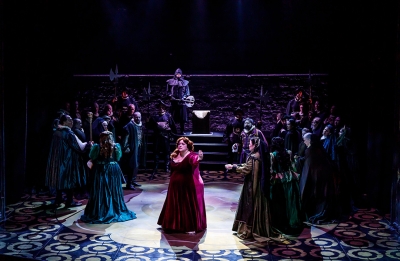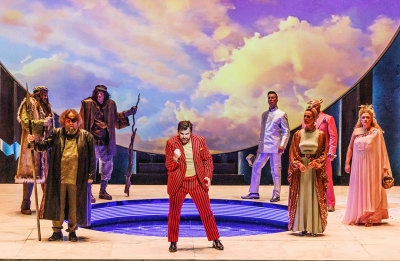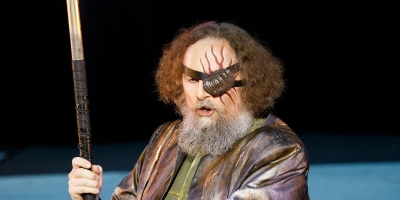Melbourne Opera
There was a real sense of occasion on Thursday evening before the opening performance of Melbourne Opera’s new production of Gaetano Donizetti’s Lucia di Lammermoor, first performed in 1835, with a libretto by Salvatore Cammarano, based on Sir Walter Scott’s novel The Bride of Lammermoor (1819). Bagpipes summoned us along Collins Street. Inside, the Athenaeum Theatre seemed close to full.
... (read more)The fecundity of Gaetano Donizetti in the 1830s – when he was in his thirties – was exceptional, even during those rampant years for Italian opera. His successes were frequent: Anna Bolena (1830), L’elisir d’amore (1832), Lucrezia Borgia (1833), Maria Stuarda (1834), and Lucia di Lammermoor (1835), perhaps his finest achievement. Donizetti, who wrote about seventy operas in all before his mental collapse in 1846, was the nimblest of composers. Between L’elisir and Lucrezia, for instance, came four operas, all rarities today.
... (read more)The past few weeks in Melbourne have seen a series of extraordinary musical events that collectively represent the ultimate triumph of the creative spirit over the forces of pestilence – something that applies equally to audiences as well as performers. There is certainly, hanging in the air, a palpable spirit of communion and fulfilled expectations from our re-emergence from the stygian isolation of Covid lockdown into the iridescent aura that only live performances can achieve. In Wagnerian terms, we are all Brünnhildes, reawakening from lengthy slumber to joyfully hail the sunlight. As it was – in life and in art – at Sunday’s magnificent performance of Siegfried.
... (read more)Few opera composers were more prolific than Gaetano Donizetti, and 1833 proved to be no exception in his relatively short career, with four separate premières in as many cities, culminating in Lucrezia Borgia, first heard at La Scala on 26 December. That season ran for thirty-three performances. The opera went on to become a popular vehicle for prima donnas (some nearing the end of their careers). Melbourne Opera’s reliably good program informs us that Lucrezia had its Australian première at Melbourne’s Theatre Royal in 1855 and remained popular for forty years, becoming Donizetti’s most performed opera in Victoria after Lucia di Lammermoor.
... (read more)Richard Wagner’s famous pronouncement, ‘Kinder, schafft Neues!’ (‘Children, create something new!’), has often been the inspiration to take daring creative risks, particularly (but not exclusively) with productions of his works. Using The Ring as a starting point, directorial licence has been extended in all sorts of intriguing ways that have, over the years, seen Valkyries roaring around on motorcycles, Rhinemaidens as strutting Victorian doxies, the dragon Fafner at the turret of an army tank, Wotan as a Texan oligarch, Siegfried as a hippie, and Gunther and the Gibichungs as Nazis.
... (read more)As the third Verdi opera on offer in Melbourne this season (along with Opera Australia’s Aida and Ernani), Melbourne Opera’s production of Verdi’s Macbeth at Her Majesty’s Theatre is a mixed offering. Verdi wrote Macbeth – one of his earliest operas and less celebrated than his later Shakespearean works, Otello (1887) and Falstaff (1893) – when he was thirty-three; it had its première in Florence in 1847. Both musically and dramatically, it is clearly rooted in the bel canto era, which prioritised beautiful singing above all else. In 1865, Verdi revised the opera for the Paris Opera. Usually, one version or the other is performed; however, this performance saw an amalgamation of the two. This creation of a new version of Verdi’s work might be considered either innovative or musicologically messy. Regardless, it further complicates the relationship between source work and adaptation that is, for better or worse, always at play in Shakespeare-based opera.
... (read more)Finally liberated from the solitude of our lounge rooms and Netflix subscriptions, sitting in Melbourne’s Regent Theatre shoulder-to-shoulder on Wednesday night felt like a forbidden treat. The palpable exuberance of being back on the town, though, was tempered by a profound appreciation of our delicately privileged position. As the first major opera performance in Melbourne after a protracted Covid shutdown of the live performing arts, Melbourne Opera’s Das Rheingold marks an important moment in the cultural life of the city – the beginning both of Richard Wagner’s Ring Cycle and of a new chapter in the living operatic history of Melbourne.
... (read more)Beethoven struggled with his only opera, Fidelio, for more than a decade, composing, rearranging, and composing anew until, in 1814, he declared that the opera would earn him a ‘martyr’s crown’. This tale of Leonore, who infiltrated a Spanish prison disguised as a man to liberate her husband, Florestan, allowed the composer to express his deepest thoughts on justice and freedom.
... (read more)









